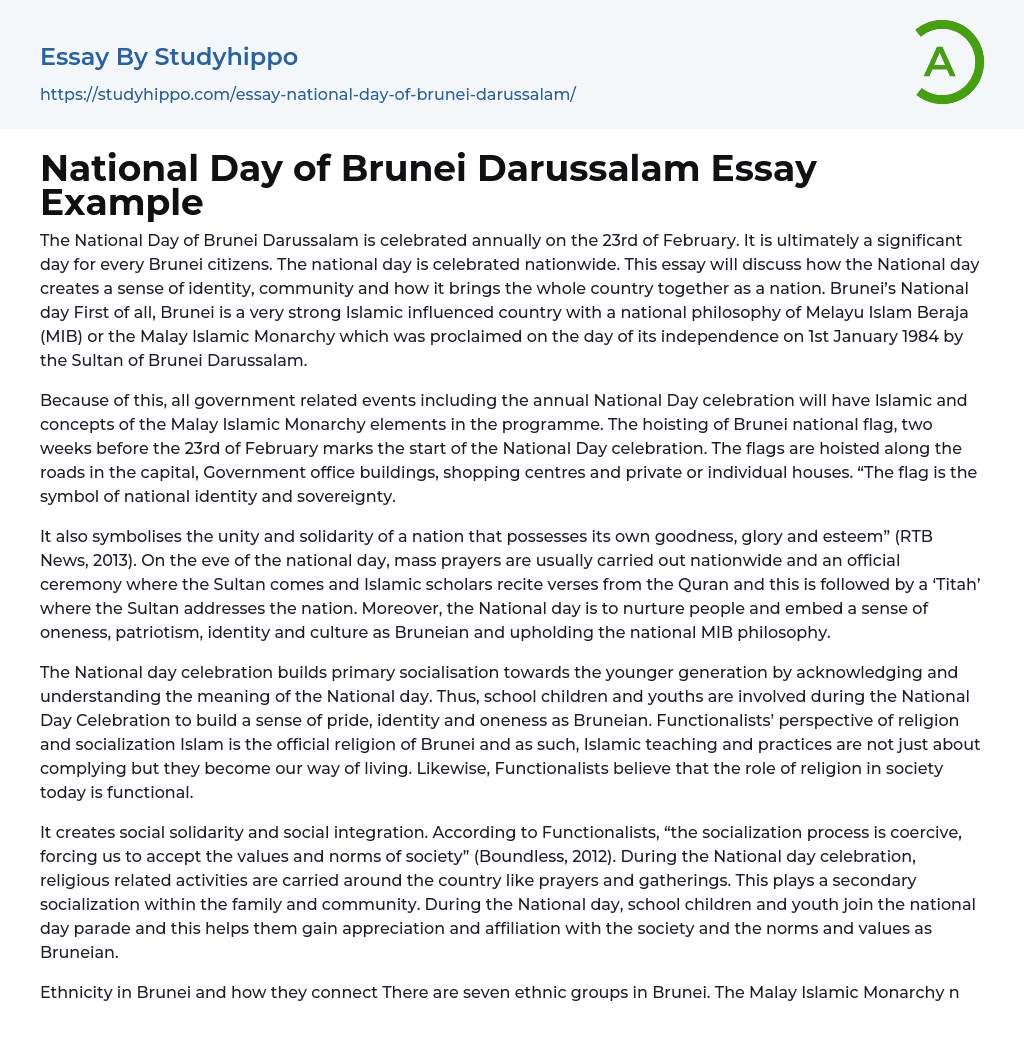The National Day of Brunei Darussalam is celebrated annually on the 23rd of February. It is ultimately a significant day for every Brunei citizens. The national day is celebrated nationwide. This essay will discuss how the National day creates a sense of identity, community and how it brings the whole country together as a nation. Brunei’s National day First of all, Brunei is a very strong Islamic influenced country with a national philosophy of Melayu Islam Beraja (MIB) or the Malay Islamic Monarchy which was proclaimed on the day of its independence on 1st January 1984 by the Sultan of Brunei Darussalam.
Because of this, all government related events including the annual National Day celebration will have Islamic and concepts of the Malay Islamic Monarchy elements in the programme. The hoisting of Brunei national fl
...ag, two weeks before the 23rd of February marks the start of the National Day celebration. The flags are hoisted along the roads in the capital, Government office buildings, shopping centres and private or individual houses. “The flag is the symbol of national identity and sovereignty.
It also symbolises the unity and solidarity of a nation that possesses its own goodness, glory and esteem” (RTB News, 2013). On the eve of the national day, mass prayers are usually carried out nationwide and an official ceremony where the Sultan comes and Islamic scholars recite verses from the Quran and this is followed by a ‘Titah’ where the Sultan addresses the nation. Moreover, the National day is to nurture people and embed a sense of oneness, patriotism, identity and culture as Bruneian and upholding the national MIB philosophy.
View entire sample
justify">The National day celebration builds primary socialisation towards the younger generation by acknowledging and understanding the meaning of the National day. Thus, school children and youths are involved during the National Day Celebration to build a sense of pride, identity and oneness as Bruneian. Functionalists’ perspective of religion and socialization Islam is the official religion of Brunei and as such, Islamic teaching and practices are not just about complying but they become our way of living. Likewise, Functionalists believe that the role of religion in society today is functional.
It creates social solidarity and social integration. According to Functionalists, “the socialization process is coercive, forcing us to accept the values and norms of society” (Boundless, 2012). During the National day celebration, religious related activities are carried around the country like prayers and gatherings. This plays a secondary socialization within the family and community. During the National day, school children and youth join the national day parade and this helps them gain appreciation and affiliation with the society and the norms and values as Bruneian.
Ethnicity in Brunei and how they connect There are seven ethnic groups in Brunei. The Malay Islamic Monarchy national philosophy where Malay language, customs and culture are practised which follow the teachings of Islamic laws and values as well as the monarchy system which need be practices by all. The Malays are the main ethnic group in Brunei who make about 75% of the country’s population. The Chinese who came to Brunei in the early 1600 make up about 15% of the country’s population. The remaining percentages are of the indigenous groups and emigrants.
During the National day,
ethnicity, race and religion are no barrier for socialization. Respective ethnic groups participated in the national event and also showcased their culture, tradition and old heritage for the other Bruneians to know and understand especially among the younger generation (BT News, 2012). Conclusion Brunei’s National day celebration is very unique because it is the avenue for all Bruneians regardless of their ethnicity, religion and cultural background to get together, identifies them as Bruneian, contributes to the nation and lives peacefully under the MIB national philosophy.
The official broadcaster Radio Television Brunei says “The National day “epitomises the manifestation that all true citizens who recognise the meaning of nationhood and statehood will continue to absorb and assimilate the values of patriotism which need to be nurtured within the souls of such citizens as the core of strength in nationhood and statehood” (RTB News, 2013).
- Quran essays
- Al-Qaeda essays
- Muhammad essays
- Muslim essays
- Ali essays
- Ramadan essays
- Afterlife essays
- Atheism essays
- Bible essays
- Buddhism essays
- Christian Worldview essays
- Christianity essays
- Confession essays
- Cosmological Argument essays
- Deism essays
- Devil essays
- Existence of God essays
- Faith essays
- Freedom Of Religion essays
- God essays
- Hinduism essays
- Immortality essays
- Islam essays
- Jainism essays
- Jews essays
- Judaism essays
- Miracle essays
- Monk essays
- Monotheism essays
- New Testament essays
- Old Testament essays
- Pilgrimage essays
- Puritans essays
- Revelation essays
- Ritual essays
- Salvation essays
- Sin essays
- Sinners essays
- Soul essays
- Taoism essays
- Temple essays
- Theology essays
- Activism essays
- Communism essays
- Conservatism essays
- Liberalism essays
- Marxism essays
- Nationalism essays
- Patriotism essays
- Policy essays




